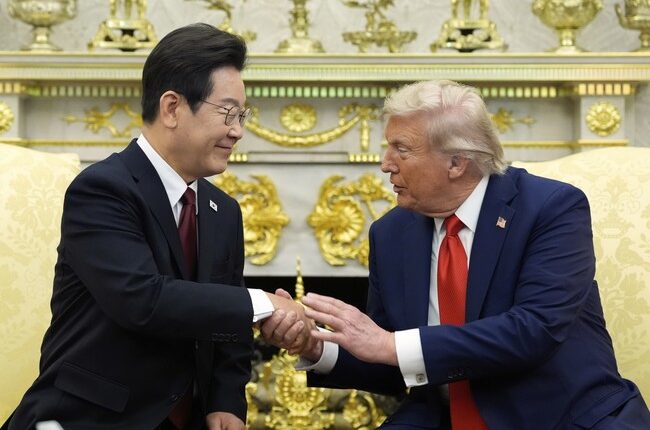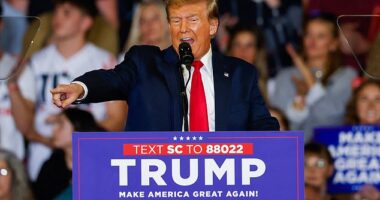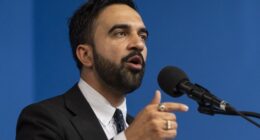
On August 25, President Trump hosted South Korean President Lee Jae Myung at the White House for a summit to discuss trade, defense, shipbuilding, and other topics.
Before the meeting took place, I wrote a piece detailing the Lee government’s anti-American, pro-CCP, and pro-North Korea actions and how they pose a great risk to South Korea’s democracy and the U.S.-Republic of Korea (ROK) alliance.
READ MORE: Attention Washington: South Korea Is Undergoing an Alarming Anti-US, Pro-CCP Drift
The day of the summit, President Trump released a statement on Truth Social expressing concern over the Lee government’s measures:
— Rapid Response 47 (@RapidResponse47) August 25, 2025
Lee’s cold reception by the Trump administration is noteworthy. He stayed at a hotel instead of the Blair House, was greeted by low-ranking officials upon his arrival, and departed Washington without a formal state dinner.
During the joint press conference in the Oval Office, Lee used excessive flattery in an attempt to win over President Trump. Lee looked uncomfortable when President Trump brought up the purges in South Korea he had mentioned in his earlier Truth Social post.
In response to this statement, Lee blatantly lied to President Trump and the public, denying any political retribution and claiming that the special prosecutor investigating former President Yoon’s “self-coup,” as he referred to it, is independent of his control. President Trump jokingly—but also very pointedly—replied to Lee’s comments about the special prosecutor:
Lee supporters online intentionally twisted President Trump’s words to make it seem as though he was insulting former President Yoon, when his comments were clearly directed at the special prosecutor.
RELATED: Trump and South Korean President Talk NoKo, Nukes, and Making Shipbuilding Great Again
President Trump also proposed acquiring South Korean land that hosts American bases, likely as a response to Lee’s raid on Osan Air Base—an event that Lee predictably denied. This proposal made Lee visibly anxious.
Lee left Washington without signing onto a joint statement. Among various areas of disagreement, Lee refused to accept a pledge to block EU-style legislation under consideration by Seoul to regulate and potentially penalize American tech companies—legislation that would benefit Beijing, which is clearly part of Lee’s plan.
President Trump undoubtedly put pressure on Lee during his visit to Washington, with many sensitive subjects likely discussed behind closed doors. Trump did not, however, publicly reprimand Lee, as that would not fit his style of communicating with foreign leaders.
Despite these signals from the Trump administration, since the summit, Lee has doubled down. Examples include issuing an arrest warrant for a pastor aligned with the People Power Party to Lee’s decision to dismiss all seven four-star generals, clearing the way for Lee loyalists.
Perhaps most concerning, though, is his targeting of critics who happen to be American nationals.
Last week, ROK officials referred six American nationals for criminal charges after attempting to send rice and Bibles to North Korea by sea in June. This comes after Lee expressed his intentions to scale back U.S.-ROK forces along the DMZ and his decision to end “Voice of Freedom” radio broadcasts into North Korea as part of his appeasement of Pyongyang.
Days later, the ROK’s National Security Director Wi Sung-lac vowed to identify the parties responsible for motivating President Trump to make his “purge” and “revolution” post and to hunt down all domestic and overseas networks that the Lee government claims gave President Trump false information, despite President Trump’s reliance on intelligence and advice from administration officials to make these statements.
This happened after Kim Joon-hyung—a lawmaker from the Rebuilding Korea Party, a leftist minor party that is aligned with Lee and his Democratic Party of Korea—urged Foreign Minister Cho Hyun to ban prominent China watcher Gordon Chang, labeling him and other Americans as far-right, anti-Korea conspiracy theorists. Cho agreed to take further action if possible.
It is highly problematic that the Lee government is now threatening to silence critics abroad, including in the U.S. This threat clearly aligns with the FBI’s definition of transnational repression, a set of tactics used by China and other authoritarian regimes to target overseas political opponents, dissidents, activists, religious and ethnic groups, members of diasporas, and anyone related to them or those who share their views:
Some foreign governments seek to intimidate and silence their citizens who are visiting or living in the United States. These governments may also target members of their diaspora who are permanent residents, naturalized or U.S.-born citizens, members of their family, or friends. These activities threaten U.S. sovereignty, violate U.S. law, and infringe on individuals’ rights and freedoms.
Foreign governments may use transnational repression tactics to silence the voices of their citizens (or non-citizens connected to the country), get information from them, or coerce them to return to the country of origin.
The Trump administration is more than likely aware of these recent threats and may respond accordingly. After all, Secretary of State Marco Rubio canceled his July meeting with Wi, the ROK official threatening to track down anti-Lee figures, following the Osan Air Base raid.
Regardless, it is incumbent upon the U.S. government to make clear to the Lee administration that targeting U.S. nationals and U.S.-based groups that are critical of Seoul is unacceptable and will not be tolerated—and will be met with consequences. This type of behavior is characteristic of a regime hostile toward the United States, not one of Washington’s closest treaty allies.
How we deal with the Lee government’s pro-CCP ideology is another question that is critical to U.S. national security. A recent National Counterintelligence and Security Center report revealed that a South Korean consulting firm searching for American semiconductor experts turned out to be a front group for the Chinese military. South Korea’s worsening Chinese infiltration is sure to have a detrimental impact on U.S. military bases and defense efforts on the peninsula.
Do not be fooled by the Lee administration’s outward appearance of being pro-American; it is anything but. This is only the opening act. The U.S.’s response has the power to define what comes next.
Editor’s Note: Do you enjoy RedState’s conservative reporting that takes on the radical left and woke media? Support our work so that we can continue to bring you the truth.
Join RedState VIP and use the promo code FIGHT to get 60% off your VIP membership!








